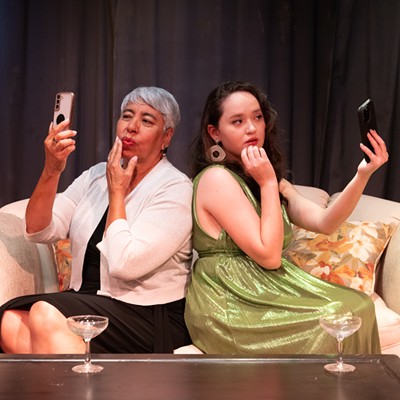Support Us
Houston's independent source of
local news and culture
account
- Welcome,
Insider - Login
- My Account
- My Newsletters
- Contribute
- Contact Us
- Sign out
El Nogalar Is Both Inspired by and Constrained by Chekhov’s The Cherry Orchard
Jessica Goldman August 2, 2016 8:00AM
[
{
"name": "Related Stories / Support Us Combo",
"component": "11591218",
"insertPoint": "4",
"requiredCountToDisplay": "4"
},{
"name": "Air - Billboard - Inline Content",
"component": "11591214",
"insertPoint": "2/3",
"requiredCountToDisplay": "7"
},{
"name": "R1 - Beta - Mobile Only",
"component": "12287027",
"insertPoint": "8",
"requiredCountToDisplay": "8"
},{
"name": "Air - MediumRectangle - Inline Content - Mobile Display Size 2",
"component": "11591215",
"insertPoint": "12",
"requiredCountToDisplay": "12"
},{
"name": "Air - MediumRectangle - Inline Content - Mobile Display Size 2",
"component": "11591215",
"insertPoint": "4th",
"startingPoint": "16",
"requiredCountToDisplay": "12"
}
,{
"name": "RevContent - In Article",
"component": "12527128",
"insertPoint": "3/5",
"requiredCountToDisplay": "5"
}
]
There’s no doubt you could easily spend your time watching the Houston premiere of Tanya Saracho’s El Nogalar ticking off the Chekhovian nods. Saracho herself will happily tell you that El Nogalar (Spanish for The Pecan Orchard) was heavily inspired by Chekhov’s comedic tragedy The Cherry Orchard, about a family’s struggle to hold onto their homestead amid crumbling finances. It’s apparently an easy inspiration for Saracho, who in addition to her playwriting cred also has a television career in Los Angeles, where she has written for Devious Maids, Looking and How to Get Away With Murder. It’s so easy that she’s been quoted as saying, “The most Latino playwright I encountered in college was Chekhov.”
But inspired may be the wrong word here. Rather than being influenced by or even serving as some kind of imaginative homage to Chekhov’s final play, El Nogalar feels more like a piece that’s been lifted, relocated and oddly added onto with lackluster results.
First, the location. Dorothy, we aren’t in Russia anymore. Instead, Saracho sets her play in present-day northern Mexico, ground zero for the violent drug warfare carried out by the vicious rival cartels that populate and patrol the area. It’s an excellent backdrop against which to portray old money versus new, status versus power and the willful ignorance of changing times. Or it would have been, but more on that later.
Then there’s our cast of characters. They may have Spanish names, but their song remains the same. The insolent and flirty maid Dunyasha becomes Dunia. Peasant turned successful businessman Lopakhin is now Lopez. Responsible and mousy daughter Varya becomes Valeria. Young and innocent teen daughter Anya is now Anita. Only the mother, Ranevskaya by Chekhov’s hand, seems to escape a cutesy new name and is instead called Maite.
For anyone wondering where all the other characters are — specifically, the five or so other men who populate The Cherry Orchard — Saracho has dropped them like hot potatoes, preferring to center her attentions on the female characters that make the story tick. But even without the extra fellas and with the added girl power, the story is more or less the same.
A once wealthy but now broke Maite (Eli Solis, suffering from a hearty case of marbles in the mouth that renders her incomprehensible at times and uncharismatic throughout) and her youngest daughter, Anita (played with refreshing flair by Adriana Dominguez), leave the United States to return to the family home in Mexico. Maite’s other daughter, Valeria (Melissa Molano in another of her many terrific performances this season), has been living in the house for the past five years, trying to fend off creditors and attempting to keep the drug lords from claiming the house and orchard as their own. Family friend Lopez (a solid Gabriel Regojo) attempts to broker a deal with the head of the cartel that will allow the family to stay on their land. Meanwhile, family maid Dunia (played with attractive sass by Valentina Olarte) watches with amusement as Maite lives in reckless denial, which causes her dwindling fortunes to dissolve along with the family’s privileged way of life.
All this on Caitlin Dean’s low-tech but nifty rotating sets. Affixed atop lazy Susan-type contraptions, an interior master bedroom and another, smaller bedroom get spun around by several stagehands (trying their best to be inconspicuous) between acts to reveal the exterior of the family’s home. Who says low-budget has to mean stagnant set design?
Love (or lust) is certainly not stagnant in Saracho’s script. As in the original story, we still get Valeria endlessly mooning over Lopez, but unable to tell him how she feels. And we still get Lopez pining over Valeria but unable to handle his feelings for her. However, in a totally baffling new twist, Saracho has Lopez sexually tied to two other characters in the play. No spoiler alert here, but suffice it to say that one of the situations is unnecessary and just plain creepy, and the other seems like an all too convenient way of breaking with the source material in order to end the play on a different note.
More successfully, Saracho (who grew up in the adjoining border towns of Reynoso, Mexico, and McAllen, Texas) infuses El Nogalar with a healthy smattering of Spanish throughout the play. And it’s here that director Kelsey McMillan has the best handle on the show and her cast. As the women throw lightning bolts of Spanish at each other — usually at times of anger or frustration — McMillan deftly makes sure, either by the English dialogue that follows in translation or simply by body language, that everyone in the audience gets the gist. Hearing another language spoken onstage, especially one that so naturally serves the story being told, is an immensely exciting and authentic experience, one that we don’t get often enough. It’s to Saracho’s credit that she trusts her audience’s ability to go with the flow and follow along.
Why then doesn’t she feel that we’re ready for the authentic experience of living amid the drug war? It’s here, it seems, that Saracho’s intention to hold tight to the original story and her desire to comment on a troubled geopolitical and criminal issue are at odds. Sure, we get Dunia’s describing the dead bodies in the street from all the gang violence. “Nobody cries here,” she says. There’s just too much death to bother crying.
But the framing of The Cherry Orchard doesn’t allow for in-depth examination of this kind of horrific reality. Chekhov’s story looks inward to comment on outward social change. So instead we see an upper-class family complaining, “We can barely afford money for necessities like Dunia or a cook to make us dinner!” Amusingly ironic stuff when delivered, and sure, it still speaks to the demise of the elite. But it’s far less interesting than what’s going on outside the doors. Throughout the show, we feel trapped by construct, desperate for someone to say, “Look over there, outside the orchard gates; let’s talk about that!”
But if the limits of the show seem claustrophobic, we can be thankful for two knockout performances that keep us engaged. Molano as Valeria has the unglamorous task of playing the plain-Jane, weepy, stick-in-the-mud, responsible one. The one you want to shoo away because she’s such a downer. But in Molano’s very talented hands, Valeria becomes a force. Calm when calm is needed. Angry when things need shaking up. Judgmental when others need tut-tutting. Even her passivity when it comes to her love for Lopez seems reasonable because of her ability to draw us over to her side.
Dominguez’s Anita, on the other hand, is just as compelling being a naive, spoiled but likable, immature young woman. Blessed with many of the show’s humorously entitled lines (“Is no one going to feed me?”), Dominguez manages to be a brat without being off-putting. She is spoiled, but it’s an ignorant kind of spoiled that leaves room for empathy. In what is by a landslide the show’s best scene, Anita and Dunia discuss how to snag a man and the pressures on Anita to live up to her family’s expectations. It’s in these more thoughtful moments that Dominguez truly shines as a performer in touch with her young character’s fears and hopes. We hang on every word.
What we don’t hang onto, though, is the Chekhov riff. It’s not as though we don’t like a good reboot. Houston is no stranger to unique and intriguing adaptations of the iconic playwright’s works. Just in the past two years alone, we’ve hosted Aaron Posner’s superlative homage to The Seagull, cheekily titled Stupid Fucking Bird, and Mickle Maher’s hysterical The Hunchback Variations, which debates the unknowable sound cue in The Cherry Orchard. What these efforts had that El Nogalar is lacking is insight on or commentary about Chekhov’s work and the ability to push the ideas forward with humor and provocation. In other words, something new that we want to chew on and digest.
Instead, chewing on El Nogalar feels like working a tough piece of leather that just won’t give. Saracho obviously has things to say, ways of saying them and places to show us. I look forward to seeing her work unfettered by canon and convention, paying heed to nothing but her own imagination.
El Nogalar continues through August 20 at the Obsidian Theater, 3522 White Oak. For information visit obsidiantheater.org.
KEEP THE HOUSTON PRESS FREE...
Since we started the Houston Press, it has been defined as the free, independent voice of Houston, and we'd like to keep it that way. With local media under siege, it's more important than ever for us to rally support behind funding our local journalism. You can help by participating in our "I Support" program, allowing us to keep offering readers access to our incisive coverage of local news, food and culture with no paywalls.
Jessica Goldman was the theater critic for CBC Radio in Calgary prior to joining the Houston Press team. Her work has also appeared in American Theatre Magazine, Globe and Mail and Alberta Views. Jessica is a member of the American Theatre Critics Association.
Contact:
Jessica Goldman
Trending Arts & Culture
- Reviews For The Easily Distracted:
Deadpool & Wolverine - And Then There Were None at the Alley Leaves You Guessing Till the Very End
- Theater Magic: The Wizard of Oz at Queensbury Theatre
-
Sponsored Content From: [%sponsoredBy%]
[%title%]

Don't Miss Out
SIGN UP for the latest
arts & culture
news, free stuff and more!
Become a member to support the independent voice of Houston
and help keep the future of the Houston Press FREE
Use of this website constitutes acceptance of our
terms of use,
our cookies policy, and our
privacy policy
The Houston Press may earn a portion of sales from products & services purchased through links on our site from our
affiliate partners.
©2024
Houston Press, LP. All rights reserved.





